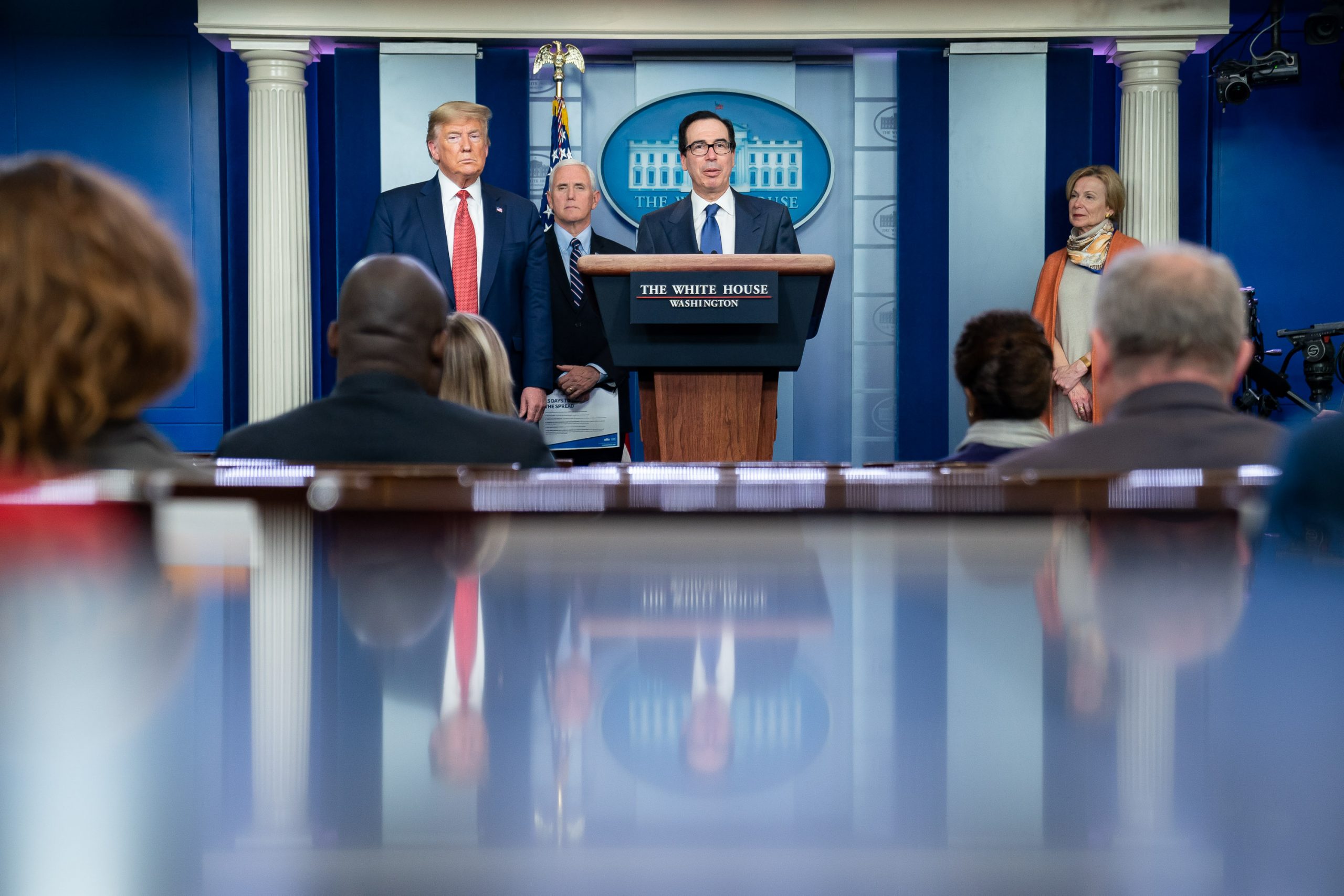Pictured above: Secretary of the Treasury Steven Mnuchin joins U.S. President Donald J. Trump and Vice President Mike Pence as he delivers remarks on aspects of the stimulus package currently before Congress, during the coronavirus (COVID-19) update briefing Wednesday, March 25, 2020, in the James S. Brady Press Briefing Room of the White House.
Official White House Photo by Tia Dufour
By Trevor Martindale
On March 27, President Donald Trump signed a $2.2 trillion coronavirus relief package into law after a unanimous vote in the Senate.
This stimulus package — the largest in U.S. history — will include direct cash payments, expansion of unemployment aid, and the brief suspension of student loan interest. Direct cash payments will include $1,200 for taxpayers who earn up to $75,000 a year and $500 per child under the age of 17.
You must be wondering: “As college students, will we qualify as recipients of the relief funds?” For most students, the likely answer is no.
This is because of the methodology used to identify individual annual income. Individuals will receive the payment based on their 2019 tax returns. If you are listed as a dependent to your parent or guardian, you will be ineligible for compensation.
At this time, our government must recognize students in the workforce. According to Pew Research Center, a nonpartisan American think tank, young workers (aged 18-24) make up 24 percent of the industries categorized as “high risk” to closure.
Those who live off campus and pay monthly rent may be unable to do so for months to come. There’s no moratorium on rent or other mandatory expenses during a pandemic. We must stand with our student workers and demand compensation.
Also, many college students who previously lived on campus have moved back to their parents’ or guardians’ house after being told to leave. Since guardians will only receive $500 per child under the age of 17, parents of college students (who may no longer be working) will not receive aid for the extra head under their roof.
Recently, the Federal Reserve estimated unemployment could reach 32.1 percent, a rate that exceeds that of the Great Depression –– which peaked around 24.9 percent. Failing to accommodate parents –– many of whom have also lost their jobs due to the pandemic –– is unsustainable.
At universities across the U.S., students have dealt with a disruptive transition to online classes and a sudden loss of living spaces. The last burden students need is to be exempt from necessary government relief during a global pandemic.
We must demand recognition of students as a part of the workforce, even if they are listed as dependents on their parents’ tax returns. Families of students disproportionately affected by the economic crisis must be compensated for the newfound expense of hosting their child.
College students have been deeply affected by this crisis and should receive assistance like everyone else. This should not be a difficult task, considering the $500 billion corporate bailout fund included in the stimulus package. Congress must quickly introduce a new relief package to account for vulnerable students and families.
Additionally, the stimulus bill allocates around $14 billion to colleges and universities. According to The New York Times, 46 percent of the $30.75 billion education stabilization fund included in the deal would go to higher education.
This has prompted the Tampa Bay chapter of Students for a Democratic Society –– a progressive organization of student activists –– to petition the university for refunds and paid time off.
“USF students deserve to be monetarily reimbursed due to not receiving the same quality of education and services that were initially paid for,” the petition stated. “Students go into a lot of student debt to receive these educational services as well as the college experience.
“The stimulus package to universities should be going to the people who are no longer receiving the same services that were originally paid for.”
It also argued employees of the university shouldn’t have to choose between “their health and their pay” during a pandemic. The petition has collected 284 signatures as of April 1.
While we may not qualify for federal relief, there are other resources available. In light of the coronavirus pandemic, USF system President Steve Currall has established the USF United Support Fund. In just over a week, 725 donors have already contributed $127,750 to the fund.
Students can request up to $1,000 from the fund by completing the application here and emailing it to the Financial Aid office with documentation supporting the requested amount.
It’s not a $1,200 check from the federal government, but it could make a difference.



